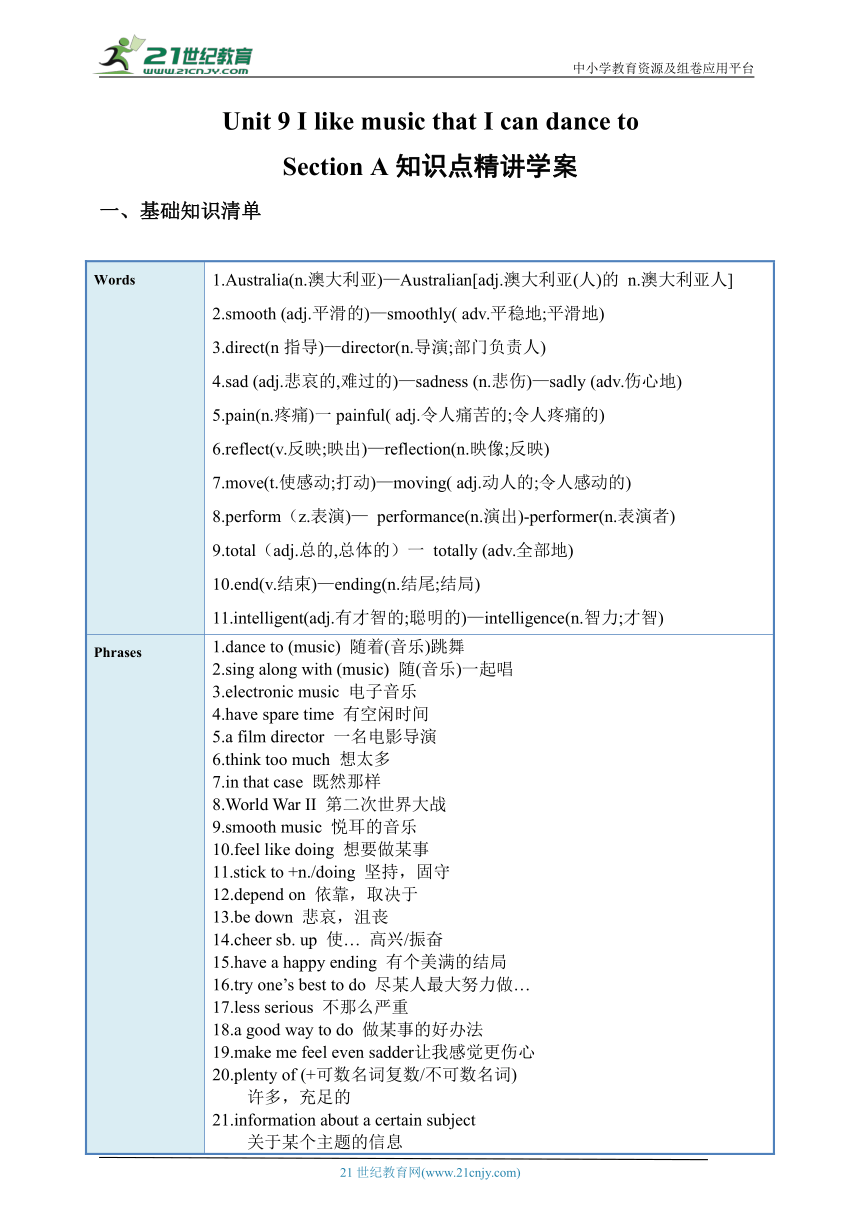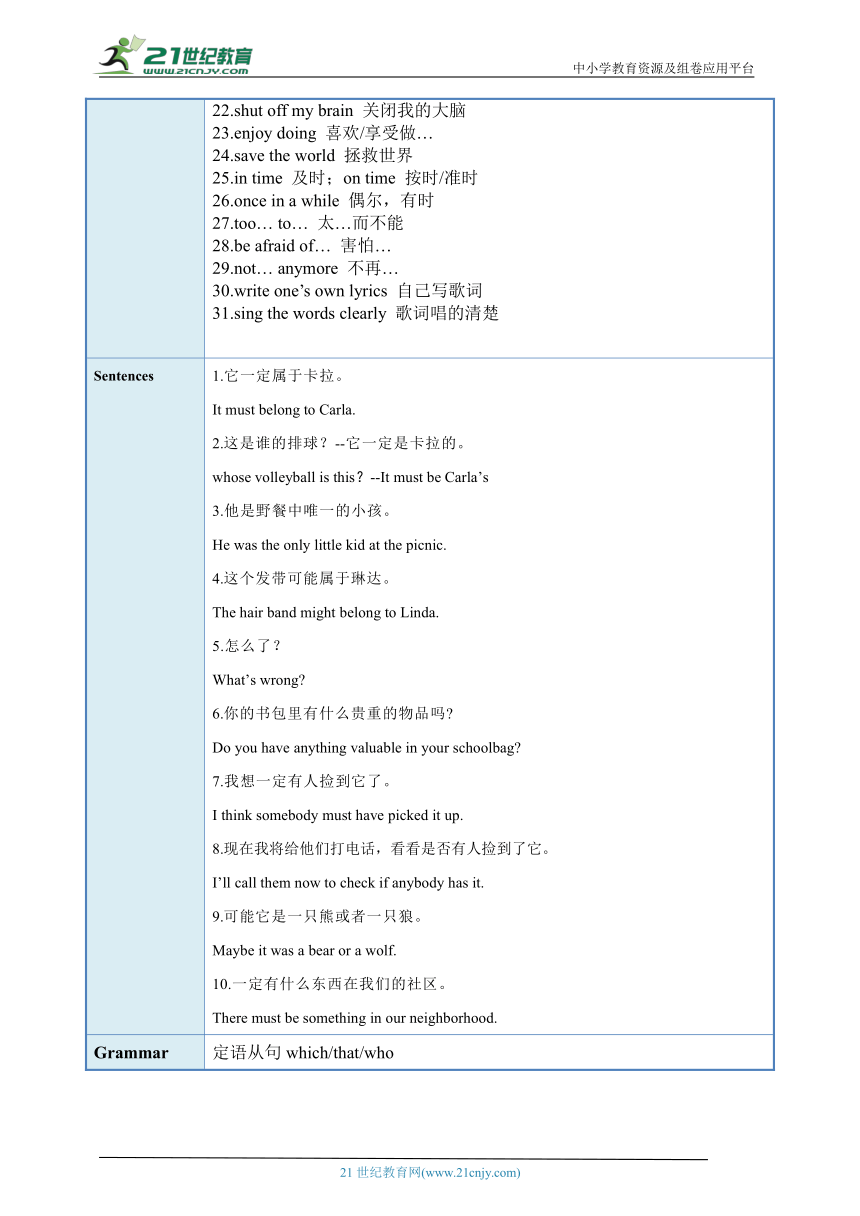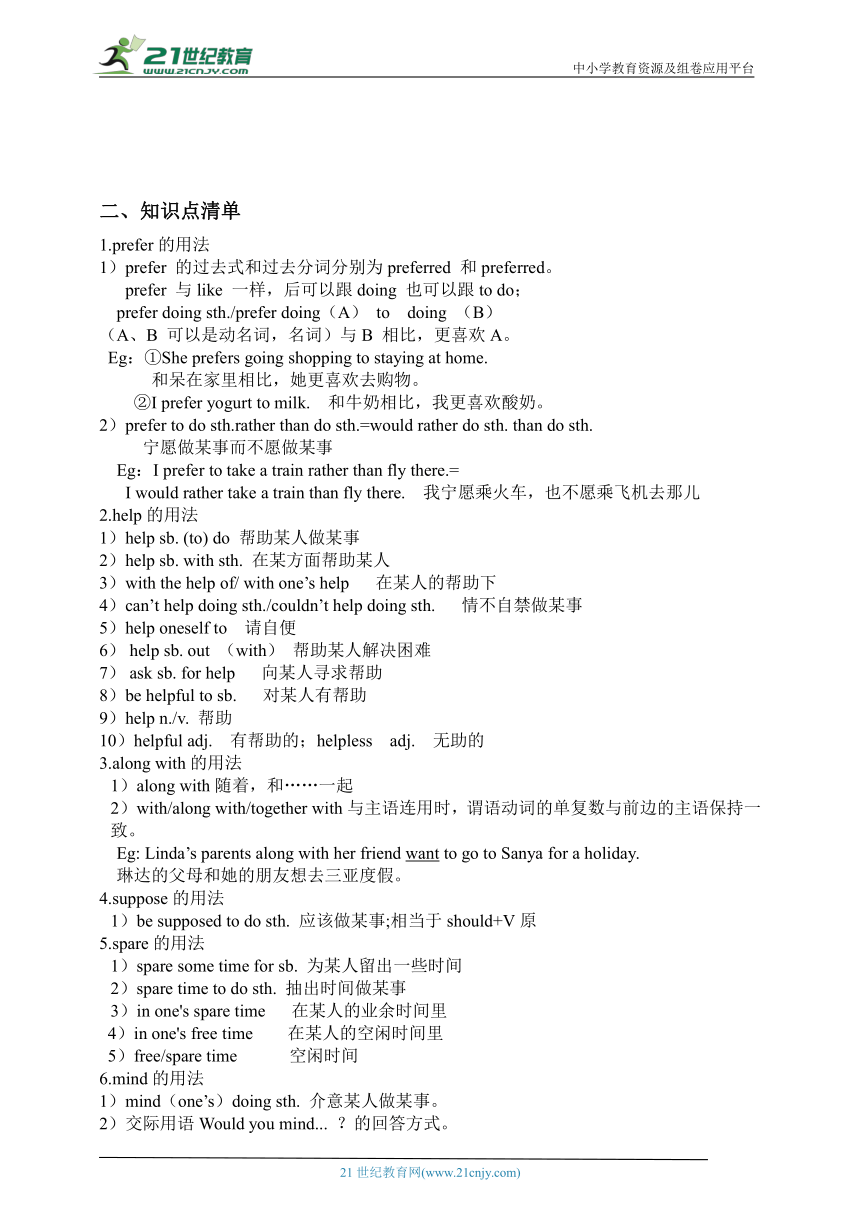Unit 9 I like music that I can dance to Section A知识点精讲学案
文档属性
| 名称 | Unit 9 I like music that I can dance to Section A知识点精讲学案 |

|
|
| 格式 | doc | ||
| 文件大小 | 1.2MB | ||
| 资源类型 | 试卷 | ||
| 版本资源 | 人教新目标(Go for it)版 | ||
| 科目 | 英语 | ||
| 更新时间 | 2023-11-27 00:00:00 | ||
图片预览



文档简介
中小学教育资源及组卷应用平台
Unit 9 I like music that I can dance to
Section A知识点精讲学案
一、基础知识清单
Words 1.Australia(n.澳大利亚)—Australian[adj.澳大利亚(人)的 n.澳大利亚人]2.smooth (adj.平滑的)—smoothly( adv.平稳地;平滑地)3.direct(n指导)—director(n.导演;部门负责人)4.sad (adj.悲哀的,难过的)—sadness (n.悲伤)—sadly (adv.伤心地)5.pain(n.疼痛)一painful( adj.令人痛苦的;令人疼痛的)6.reflect(v.反映;映出)—reflection(n.映像;反映)7.move(t.使感动;打动)—moving( adj.动人的;令人感动的)8.perform(z.表演)— performance(n.演出)-performer(n.表演者)9.total(adj.总的,总体的)一 totally (adv.全部地)10.end(v.结束)—ending(n.结尾;结局)11.intelligent(adj.有才智的;聪明的)—intelligence(n.智力;才智)
Phrases 1.dance to (music) 随着(音乐)跳舞 2.sing along with (music) 随(音乐)一起唱3.electronic music 电子音乐 4.have spare time 有空闲时间5.a film director 一名电影导演 6.think too much 想太多7.in that case 既然那样8.World War II 第二次世界大战9.smooth music 悦耳的音乐 10.feel like doing 想要做某事 11.stick to +n./doing 坚持,固守12.depend on 依靠,取决于13.be down 悲哀,沮丧 14.cheer sb. up 使… 高兴/振奋15.have a happy ending 有个美满的结局 16.try one’s best to do 尽某人最大努力做…17.less serious 不那么严重 18.a good way to do 做某事的好办法19.make me feel even sadder让我感觉更伤心20.plenty of (+可数名词复数/不可数名词)许多,充足的21.information about a certain subject 关于某个主题的信息22.shut off my brain 关闭我的大脑 23.enjoy doing 喜欢/享受做…24.save the world 拯救世界25.in time 及时;on time 按时/准时26.once in a while 偶尔,有时 27.too… to… 太…而不能28.be afraid of… 害怕…29.not… anymore 不再…30.write one’s own lyrics 自己写歌词31.sing the words clearly 歌词唱的清楚
Sentences 1.它一定属于卡拉。It must belong to Carla.2.这是谁的排球?--它一定是卡拉的。whose volleyball is this?--It must be Carla’s3.他是野餐中唯一的小孩。He was the only little kid at the picnic.4.这个发带可能属于琳达。The hair band might belong to Linda.5.怎么了?What’s wrong 6.你的书包里有什么贵重的物品吗 Do you have anything valuable in your schoolbag 7.我想一定有人捡到它了。I think somebody must have picked it up.8.现在我将给他们打电话,看看是否有人捡到了它。I’ll call them now to check if anybody has it.9.可能它是一只熊或者一只狼。Maybe it was a bear or a wolf.10.一定有什么东西在我们的社区。There must be something in our neighborhood.
Grammar 定语从句which/that/who
二、知识点清单
1.prefer的用法
1)prefer 的过去式和过去分词分别为preferred 和preferred。
prefer 与like 一样,后可以跟doing 也可以跟to do;
prefer doing sth./prefer doing(A) to doing (B)
(A、B 可以是动名词,名词)与B 相比,更喜欢A。
Eg:①She prefers going shopping to staying at home.
和呆在家里相比,她更喜欢去购物。
②I prefer yogurt to milk. 和牛奶相比,我更喜欢酸奶。
2)prefer to do sth.rather than do sth.=would rather do sth. than do sth.
宁愿做某事而不愿做某事
Eg:I prefer to take a train rather than fly there.=
I would rather take a train than fly there. 我宁愿乘火车,也不愿乘飞机去那儿
2.help的用法
1)help sb. (to) do 帮助某人做某事
2)help sb. with sth. 在某方面帮助某人
3)with the help of/ with one’s help 在某人的帮助下
4)can’t help doing sth./couldn’t help doing sth. 情不自禁做某事
5)help oneself to 请自便
help sb. out (with) 帮助某人解决困难
ask sb. for help 向某人寻求帮助
8)be helpful to sb. 对某人有帮助
9)help n./v. 帮助
10)helpful adj. 有帮助的;helpless adj. 无助的
3.along with的用法
along with随着,和……一起
with/along with/together with与主语连用时,谓语动词的单复数与前边的主语保持一致。
Eg: Linda’s parents along with her friend want to go to Sanya for a holiday.
琳达的父母和她的朋友想去三亚度假。
4.suppose的用法
be supposed to do sth. 应该做某事;相当于should+V原
5.spare的用法
spare some time for sb. 为某人留出一些时间
2)spare time to do sth. 抽出时间做某事
3)in one's spare time 在某人的业余时间里
4)in one's free time 在某人的空闲时间里
5)free/spare time 空闲时间
6.mind的用法
1)mind(one’s)doing sth. 介意某人做某事。
2)交际用语Would you mind... ?的回答方式。
不介意:Not at all. /Of course not./Certainly not. 根本不。/ 当然不。/ 一点也不。
介意:Sorry, but ...You’d better not... 对不起, 但……你最好不要……
3)后接V-ing的动词有:
finish、enjoy、mind、miss、suggest、practice、keep、avoid、imagine、advise、consider、allow 、mention give up、keep on、feel like、can't help、put off 、be used to、be busy、be worth
7.辨析:plenty of, a number of 、the number of与an amount of
1)plenty of=lots of=a lot of 后接可数名词复数或不可数名词,作主语时,谓语动词的单复数与名词保持一致
2)a number of 后接可数名词复数形式,作主语时,谓语动词用复数
3)the number of ...的数量,后跟名词复数作主语时,谓语动词用单数
4)an amount of 后接不可数名词,作主语时,谓语动词用单数
8.stick的用法
1)stick to 坚持,固守;to为介词;后跟v-ing或名词;
2)stick... into... 把...刺...入...里
3)stick sth. on... 把某物粘贴到...上
4)stick--过去式stuck--过去分词 stuck
9.seem的用法
1)seem (to be)+adj. 好像...
2)seem to do sth. 似乎做某事
3)It seems that 从句 看起来好像是...
4)It seems/seemed like... 似乎...;好像...;like为介词,其后接名词;
10.afraid的用法
1)be afraid of+V-ing 害怕
2)be afraid to do sth. 害怕做某事
3)I’m afraid so. 恐怕是这样。
4)I’m afraid not. 恐怕不行。
三、语法清单
定语从句
一、定语从句的概念
在复合句中,修饰某一名词或代词的从句叫定语从句。被修饰的名词或代词叫先行词,定语从句一般放在先行词的后面。
The woman who / that has short curly hair is my English teacher.
先行词 关系词 定 语 从 句
那个有着短卷发的女的是我的英语老师。
二、定语从句的关系词
引导定语从句的关系词有关系代词和关系副词,常见的关系代词包括that, which, who(宾格whom,所有格whose)等,关系副词where, when, why等。关系代词和关系副词放在先行词及定语从句之间起连接作用,同时又作定语从句的重要成分。
①I am waiting for the boy who /that is wearing a red coat.
先行词 关系代词(作主语)
我正在等穿着红色外套的那个男孩。
② The dictionary that / which my sister gave me last Sunday is very expensive.
先行词 关系代词(作动词gave的宾语)
我姐姐上周星期天给我的那本字典很贵。
③ The woman whose name is Linda Brown is his mother.
先行词 关系代词(作定语修饰名词name)
那个是他的母亲,名叫琳达 布朗。
④ That is the house where my father used to live.
先行词 关系副词(作地点状语)
那是我父亲曾经居住过的房子。
三、关系代词的用法
1. that 既可以用于指人,也可以用于指物。在从句中作主语或宾语,作主语时不可省略,作宾语时可省略。例如:
① Mary likes music that is quiet and gentle.
先行词 (that作主语不可省略)
② The coat (that) I put on the desk is blue.
先行词 (that作动词put的宾语可省略)
2. which用于指物,在句中作主语或宾语,作主语不可省略,作宾语可省略。例如:
① The building which stands near the train station is a supermarket.
先行词 (which作主语不可省略)
② The film (which) we saw last night was wonderful.
先行词 (which作动词saw的宾语可省略)
3. who, whom都用于指人,who用作主语,whom用作宾语。在口语中,有时可用who代替whom,也可省略。例如:
① The girl who often helps me with my English is from England.
(作主语不可省略)
② Who is the teacher (who/whom) Li Ming is talking to
(作动词词组talk to的宾语,可省略)
小结:that—既指人,也指物,作主语,不能省;作宾语,可以省。
which—指物,作主语,不能省;作宾语,可以省。
who—指人,作主语,不能省;作宾语(常用whom),可以省。
注:当关系代词在定语从句中作主语时,定语从句的谓语动词形式由先行词定。
使用关系代词时应注意以下几点:
如果先行词是all, anything, something, nothing, everything, little, none等不定代词, 关系代词一般只用that, 不用which。
例如:All that are present burst into tears.
如果先行词被形容词最高级以及first, last, any, only, few, much, no, some, very等词修饰, 关系代词常用that, 不用which。
例如:The first lesson that I learned will never be forgotten.
3.先行词中既有人又有物时, 关系代词应该用that。
例如:The boy and the dog that are in the picture are very lovely.
关系副词的用法
关系副词可代替的先行词是时间、地点或理由的名词,在从句中作状语。
关系副词when, where, why的含义相当于"介词+ which"结构,因此常常和"介词+ which"结构交替使用。
(1) when指时间,其先行词表示时间,在句中作时间状语。例如:
This was the time when he arrived.
(2) where指地点,其先行词表示地点,在句中作地点状语。例如:
This is the place where (in which)he works.
(3) why 指原因,其先行词是原因,起原因状语作用。例如:
Nobody knows the reason why (for which) he is often late for school.
先行词为地点
区别: Shanghai is the city _________ I was born.
This is the place __________ I visited last year.
小结: 当先行词代入从句后无需加介词时,用which/ that 引导;
当先行词代入从句后要加多介词时用:介词 + which 或 where 引导定语从句.
( )1. The park _______ I saw yesterday, is very nice.
A. where B. which C. that D. when
( )2. The park _______ I met him for the first time is very nice.
A. where B. which C. that D. when
21世纪教育网 www.21cnjy.com 精品试卷·第 2 页 (共 2 页)
HYPERLINK "http://21世纪教育网(www.21cnjy.com)
" 21世纪教育网(www.21cnjy.com)
Unit 9 I like music that I can dance to
Section A知识点精讲学案
一、基础知识清单
Words 1.Australia(n.澳大利亚)—Australian[adj.澳大利亚(人)的 n.澳大利亚人]2.smooth (adj.平滑的)—smoothly( adv.平稳地;平滑地)3.direct(n指导)—director(n.导演;部门负责人)4.sad (adj.悲哀的,难过的)—sadness (n.悲伤)—sadly (adv.伤心地)5.pain(n.疼痛)一painful( adj.令人痛苦的;令人疼痛的)6.reflect(v.反映;映出)—reflection(n.映像;反映)7.move(t.使感动;打动)—moving( adj.动人的;令人感动的)8.perform(z.表演)— performance(n.演出)-performer(n.表演者)9.total(adj.总的,总体的)一 totally (adv.全部地)10.end(v.结束)—ending(n.结尾;结局)11.intelligent(adj.有才智的;聪明的)—intelligence(n.智力;才智)
Phrases 1.dance to (music) 随着(音乐)跳舞 2.sing along with (music) 随(音乐)一起唱3.electronic music 电子音乐 4.have spare time 有空闲时间5.a film director 一名电影导演 6.think too much 想太多7.in that case 既然那样8.World War II 第二次世界大战9.smooth music 悦耳的音乐 10.feel like doing 想要做某事 11.stick to +n./doing 坚持,固守12.depend on 依靠,取决于13.be down 悲哀,沮丧 14.cheer sb. up 使… 高兴/振奋15.have a happy ending 有个美满的结局 16.try one’s best to do 尽某人最大努力做…17.less serious 不那么严重 18.a good way to do 做某事的好办法19.make me feel even sadder让我感觉更伤心20.plenty of (+可数名词复数/不可数名词)许多,充足的21.information about a certain subject 关于某个主题的信息22.shut off my brain 关闭我的大脑 23.enjoy doing 喜欢/享受做…24.save the world 拯救世界25.in time 及时;on time 按时/准时26.once in a while 偶尔,有时 27.too… to… 太…而不能28.be afraid of… 害怕…29.not… anymore 不再…30.write one’s own lyrics 自己写歌词31.sing the words clearly 歌词唱的清楚
Sentences 1.它一定属于卡拉。It must belong to Carla.2.这是谁的排球?--它一定是卡拉的。whose volleyball is this?--It must be Carla’s3.他是野餐中唯一的小孩。He was the only little kid at the picnic.4.这个发带可能属于琳达。The hair band might belong to Linda.5.怎么了?What’s wrong 6.你的书包里有什么贵重的物品吗 Do you have anything valuable in your schoolbag 7.我想一定有人捡到它了。I think somebody must have picked it up.8.现在我将给他们打电话,看看是否有人捡到了它。I’ll call them now to check if anybody has it.9.可能它是一只熊或者一只狼。Maybe it was a bear or a wolf.10.一定有什么东西在我们的社区。There must be something in our neighborhood.
Grammar 定语从句which/that/who
二、知识点清单
1.prefer的用法
1)prefer 的过去式和过去分词分别为preferred 和preferred。
prefer 与like 一样,后可以跟doing 也可以跟to do;
prefer doing sth./prefer doing(A) to doing (B)
(A、B 可以是动名词,名词)与B 相比,更喜欢A。
Eg:①She prefers going shopping to staying at home.
和呆在家里相比,她更喜欢去购物。
②I prefer yogurt to milk. 和牛奶相比,我更喜欢酸奶。
2)prefer to do sth.rather than do sth.=would rather do sth. than do sth.
宁愿做某事而不愿做某事
Eg:I prefer to take a train rather than fly there.=
I would rather take a train than fly there. 我宁愿乘火车,也不愿乘飞机去那儿
2.help的用法
1)help sb. (to) do 帮助某人做某事
2)help sb. with sth. 在某方面帮助某人
3)with the help of/ with one’s help 在某人的帮助下
4)can’t help doing sth./couldn’t help doing sth. 情不自禁做某事
5)help oneself to 请自便
help sb. out (with) 帮助某人解决困难
ask sb. for help 向某人寻求帮助
8)be helpful to sb. 对某人有帮助
9)help n./v. 帮助
10)helpful adj. 有帮助的;helpless adj. 无助的
3.along with的用法
along with随着,和……一起
with/along with/together with与主语连用时,谓语动词的单复数与前边的主语保持一致。
Eg: Linda’s parents along with her friend want to go to Sanya for a holiday.
琳达的父母和她的朋友想去三亚度假。
4.suppose的用法
be supposed to do sth. 应该做某事;相当于should+V原
5.spare的用法
spare some time for sb. 为某人留出一些时间
2)spare time to do sth. 抽出时间做某事
3)in one's spare time 在某人的业余时间里
4)in one's free time 在某人的空闲时间里
5)free/spare time 空闲时间
6.mind的用法
1)mind(one’s)doing sth. 介意某人做某事。
2)交际用语Would you mind... ?的回答方式。
不介意:Not at all. /Of course not./Certainly not. 根本不。/ 当然不。/ 一点也不。
介意:Sorry, but ...You’d better not... 对不起, 但……你最好不要……
3)后接V-ing的动词有:
finish、enjoy、mind、miss、suggest、practice、keep、avoid、imagine、advise、consider、allow 、mention give up、keep on、feel like、can't help、put off 、be used to、be busy、be worth
7.辨析:plenty of, a number of 、the number of与an amount of
1)plenty of=lots of=a lot of 后接可数名词复数或不可数名词,作主语时,谓语动词的单复数与名词保持一致
2)a number of 后接可数名词复数形式,作主语时,谓语动词用复数
3)the number of ...的数量,后跟名词复数作主语时,谓语动词用单数
4)an amount of 后接不可数名词,作主语时,谓语动词用单数
8.stick的用法
1)stick to 坚持,固守;to为介词;后跟v-ing或名词;
2)stick... into... 把...刺...入...里
3)stick sth. on... 把某物粘贴到...上
4)stick--过去式stuck--过去分词 stuck
9.seem的用法
1)seem (to be)+adj. 好像...
2)seem to do sth. 似乎做某事
3)It seems that 从句 看起来好像是...
4)It seems/seemed like... 似乎...;好像...;like为介词,其后接名词;
10.afraid的用法
1)be afraid of+V-ing 害怕
2)be afraid to do sth. 害怕做某事
3)I’m afraid so. 恐怕是这样。
4)I’m afraid not. 恐怕不行。
三、语法清单
定语从句
一、定语从句的概念
在复合句中,修饰某一名词或代词的从句叫定语从句。被修饰的名词或代词叫先行词,定语从句一般放在先行词的后面。
The woman who / that has short curly hair is my English teacher.
先行词 关系词 定 语 从 句
那个有着短卷发的女的是我的英语老师。
二、定语从句的关系词
引导定语从句的关系词有关系代词和关系副词,常见的关系代词包括that, which, who(宾格whom,所有格whose)等,关系副词where, when, why等。关系代词和关系副词放在先行词及定语从句之间起连接作用,同时又作定语从句的重要成分。
①I am waiting for the boy who /that is wearing a red coat.
先行词 关系代词(作主语)
我正在等穿着红色外套的那个男孩。
② The dictionary that / which my sister gave me last Sunday is very expensive.
先行词 关系代词(作动词gave的宾语)
我姐姐上周星期天给我的那本字典很贵。
③ The woman whose name is Linda Brown is his mother.
先行词 关系代词(作定语修饰名词name)
那个是他的母亲,名叫琳达 布朗。
④ That is the house where my father used to live.
先行词 关系副词(作地点状语)
那是我父亲曾经居住过的房子。
三、关系代词的用法
1. that 既可以用于指人,也可以用于指物。在从句中作主语或宾语,作主语时不可省略,作宾语时可省略。例如:
① Mary likes music that is quiet and gentle.
先行词 (that作主语不可省略)
② The coat (that) I put on the desk is blue.
先行词 (that作动词put的宾语可省略)
2. which用于指物,在句中作主语或宾语,作主语不可省略,作宾语可省略。例如:
① The building which stands near the train station is a supermarket.
先行词 (which作主语不可省略)
② The film (which) we saw last night was wonderful.
先行词 (which作动词saw的宾语可省略)
3. who, whom都用于指人,who用作主语,whom用作宾语。在口语中,有时可用who代替whom,也可省略。例如:
① The girl who often helps me with my English is from England.
(作主语不可省略)
② Who is the teacher (who/whom) Li Ming is talking to
(作动词词组talk to的宾语,可省略)
小结:that—既指人,也指物,作主语,不能省;作宾语,可以省。
which—指物,作主语,不能省;作宾语,可以省。
who—指人,作主语,不能省;作宾语(常用whom),可以省。
注:当关系代词在定语从句中作主语时,定语从句的谓语动词形式由先行词定。
使用关系代词时应注意以下几点:
如果先行词是all, anything, something, nothing, everything, little, none等不定代词, 关系代词一般只用that, 不用which。
例如:All that are present burst into tears.
如果先行词被形容词最高级以及first, last, any, only, few, much, no, some, very等词修饰, 关系代词常用that, 不用which。
例如:The first lesson that I learned will never be forgotten.
3.先行词中既有人又有物时, 关系代词应该用that。
例如:The boy and the dog that are in the picture are very lovely.
关系副词的用法
关系副词可代替的先行词是时间、地点或理由的名词,在从句中作状语。
关系副词when, where, why的含义相当于"介词+ which"结构,因此常常和"介词+ which"结构交替使用。
(1) when指时间,其先行词表示时间,在句中作时间状语。例如:
This was the time when he arrived.
(2) where指地点,其先行词表示地点,在句中作地点状语。例如:
This is the place where (in which)he works.
(3) why 指原因,其先行词是原因,起原因状语作用。例如:
Nobody knows the reason why (for which) he is often late for school.
先行词为地点
区别: Shanghai is the city _________ I was born.
This is the place __________ I visited last year.
小结: 当先行词代入从句后无需加介词时,用which/ that 引导;
当先行词代入从句后要加多介词时用:介词 + which 或 where 引导定语从句.
( )1. The park _______ I saw yesterday, is very nice.
A. where B. which C. that D. when
( )2. The park _______ I met him for the first time is very nice.
A. where B. which C. that D. when
21世纪教育网 www.21cnjy.com 精品试卷·第 2 页 (共 2 页)
HYPERLINK "http://21世纪教育网(www.21cnjy.com)
" 21世纪教育网(www.21cnjy.com)
同课章节目录
- Unit 1 How can we become good learners.
- Section A
- Section B
- Unit 2 I think that mooncakes are delicious!
- Section A
- Section B
- Unit 3 Could you please tell me where the restroom
- Section A
- Section B
- Unit 4 I used to be afraid of the dark.
- Section A
- Section B
- Unit 5 What are the shirts made of?
- Section A
- Section B
- Review of Units 1-5
- Unit 6 When was it invented?
- Section A
- Section B
- Unit 7 Teenagers should be allowed to choose their
- Section A
- Section B
- Unit 8 It must belong to Carla.
- Section A
- Section B
- Unit 9 I like music that I can dance to.
- Section A
- Section B
- Unit 10 You're supposed to shake hands.
- Section A
- Section B
- Review of Units 6-10
- Unit 11 Sad movies make me cry.
- Section A
- Section B
- Unit 12 Life is full of the unexpected
- Section A
- Section B
- Unit 13 We're trying to save the earth!
- Section A
- Section B
- Unit 14 I remember meeting all of you in Grade 7.
- Section A
- Section B
- Review of Units 11-14
